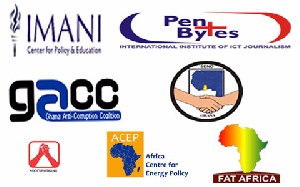 Logos of some Civil Society Organisations in Ghana
Logos of some Civil Society Organisations in Ghana
Mr Yaw Osafo Marfo, Senior Minister, has expressed government’s commitment towards supporting Civil Society Organisations (CSOs)-led social accountability initiatives because of its belief in partnerships between government and the citizenry.
He said government continues to demonstrate that zeal through the organisation of the Annual Policy Fair which brings together, government, CSOs and the private sector as well as development partners to dialogue on policies and programmes that could help government provide social services to the populace.
In a speech read on his behalf at the two-day Social Accountability and Multi Stakeholder Forum in Accra, Mr Marfo said in Ghana, participation of citizen in development was enshrined in the in law, administrative guidelines and procedures, and that such laws place emphasis on citizens participation in development.
“Also the citizens are empowered to hold public office holders to account by the supreme Audit Institution in Ghana by making it findings whether positive and negative accessible to the general public”, Mr Marfo said.
The forum, attended by government officials, local governance experts, and civil society groups from the West African sub-region, served as the first Social Accountability Multi Stakeholder Forum that aimed at sharing information on best practices involving social accountability in countries.
It was held under the theme: “Institutionalizing Social Accountability in Local Governance: the Successes, Gaps and the Way Forward”.
The Send-Ghana, CDD-Ghana, Penplusbytes and the Ghana Anti-Corruption Coalition, organised the forum that also served as information on both the supply and demand side of accountability initiatives in Ghana and Africa.
The forum formed part of projects sponsored by the Global Partnership for Social Accountability of the World Bank and Open Society Initiative for West Africa (OSIWA).
Globally and nationally, efforts at mainstreaming citizens’ engagement and feedback within the service delivery and governance process have been initiated while Civil Society Organisations have collaborated with government in diverse ways to implement a number of accountability projects in which citizen feedback was used to solve fundamental development challenges and to strengthen the performance of public institutions and service delivery, especially at the local level.
Some of these projects have contributed to strengthening citizens’ voice for demand for accountability and improved service delivery.
The forum comes at a critical time for partners working to ensure that people continue to have a role and a voice in service delivery.
Mr Marfo commended the CSOs who are supplementing Government’s efforts to promote social accountability in the implementation of diverse programmes, and delivering key services.
“We applaud CSOs for promoting social accountability in the public sector but also for mobilising citizens especially, the poor and marginalised groups to take ownership of government programmes to ensure improvement in services delivery”, the Minister said.
He gave the assurance that government would continue to work with CSOs to increase social accountability in governance as well as in the planning, implementation and delivery of public goods and services at national, regional and district levels.
“As we see spaces for civic engagement shrinking around the world, there is an increasing need to build our understanding of “what works” – and how to design better approaches and improve on existing ones to increase citizen participation and empowerment for better health, education, resource utilization, agriculture, and overall development of communities and districts in Ghana.
It aligns with Sustainable Development Goal 16 and focuses attention on the role of citizen action in building effective, accountable and inclusive institutions.
Dr Franklin Oduro, Deputy Executive Director of CDD-Ghana, said the forum forms part of global and national agenda to increase citizen’s engagement and feedback in the service delivery and governance process, especially at the local level.
He said in spite of efforts put in place by both state and non-state actors in demand and supply sides of social accountability, there was still a gap between citizens’ engagement with duty and public officials, with the demand side remaining weak, and the supply side also weak.
He said access to information on local government development plans and budgeting systems remained weak, and so there was still the need for all stakeholders to work together to help improve the system of information flow and accountability and enhance the voice of citizens in demanding accountability.